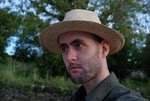
There came no scream from the dead man's lips, but a light was then shone on me and I yelped with surprise. A security guard had me trained in his torchbeam and he shouted at me to stay where I was. As if I could go anywhere, my eyes were fighting the brightness in order to catch a glimpse of the phantom execution. And as the security guard walked over, he must have become aware of the grisly scene unfolding nearby as his light flickered and swung round, illuminating the man, backlit as his body, rose, rose, rose, as if hoisted by ropes hung from the rigging of a tall ship. And then his body hung and swayed, suspended, floating there as his fluids drained away into the water.
Then the torch light died and my eyes couldn't adjust in time. Just a single splash was heard and the man was gone forever.
The shaken night watchman ambled over, scratching his head below a blue cap. He open the gate and we shared a warming coffee together in the shelter of his guardhouse. There he told me the story of Salt Bert, the crazed sailor who had attacked and eaten one of his crewmates on a freighter bound for Liverpool from New York. His captain was said to have caught him in the foul act and it took four burly seamen to catch him and hold him still. The crew then took turns to beat the treacherous cannibal sailor, slashing at him with spurs and fists. When they were done with him he was taken and locked in the ship's hold until the ship's arrival in Liverpool. The hold was filled with a cargo of salt, and not a man was said to have slept for the remainder of the voyage, such were Bert's cries of agony, shrieking from below deck.
Under Maritime Law, Bert was tried and executed at the quayside at Liverpool. His body was then thrown into the dock itself. The night-watchman, 'Captain' Tom Barrow, had seen Bert's ghost before prowling the wharfside and often, when he dozed off on duty, his sleep was duly disturbed by the agonized wails of Salt Bert.
So let's drink a drink for Bert, and remember his hideous crossing of the Atlantic Ocean, writhing day and night in salt burning agonies. Maybe you'll see him tonight, or maybe you'll hear his scream, floating along the river's edge leading him back to his grave.
The End
Thanks to JuJu Spider for the inspiration…








